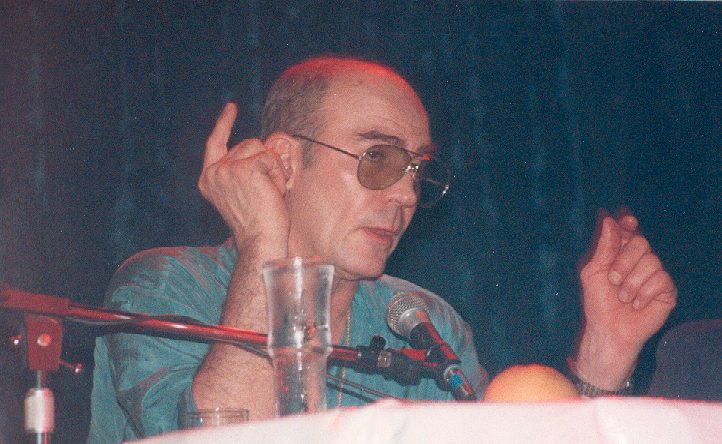
Image via Wikimedia Commons
Half a century ago, Hunter S. Thompson got his big journalistic break with a book called Hell’s Angels: The Strange and Terrible Saga of the Outlaw Motorcycle Gangs. In it he provided a curious and fearful public with a look into the inner workings of one of the most outwardly menacing social movements of the day, based on knowledge gained not by merely observing the Hell’s Angels but by getting on a hog and spending a year as a quasi-member himself. This gave him opportunity both to develop what would become his style of “gonzo journalism” in the long form and to catch an early glimpse of bigger trouble ahead in America.
“To see the Hell’s Angels as caretakers of the old ‘individualist’ tradition ‘that made this country great’ is only a painless way to get around seeing them for what they really are,” Thompson writes in that book, calling them “the first wave of a future that nothing in our history has prepared us to cope with. The Angels are prototypes. Their lack of education has not only rendered them completely useless in a highly technical economy, but it has also given them the leisure to cultivate a powerful resentment… and to translate it into a destructive cult which the mass media insists on portraying as a sort of isolated oddity” destined for extinction.
Studs Terkel, after reading that passage out loud in a 1967 interview with Thompson (stream it online here), calls it “the key” to the entire book. “Here we have technology, we have the computer, we have labor-saving devices,” he says to Thompson, but we also “have the need for more and more college education for almost any kind of job, and we have this tremendous mass of young who find themselves obsolete.” But Thompson replies that the real consequences have only started to manifest: “The people who are being left out and put behind won’t be obvious for years. Christ only knows what’ll happen in, say, 1985 — a million Hell’s Angels. They won’t be wearing the colors; they’ll be people who are just looking for vengeance because they’ve been left behind.”
The Angels, wrote Susan McWilliams in a much-circulated Nation piece late last year, “were clunky and outclassed and scorned, just like the Harley-Davidsons they chose to drive.” And “just as there was no rational way to defend Harleys against foreign-made choppers, the Angels saw no rational grounds on which to defend their own skills or loyalties against the emerging new world order of the late 20th century.” The result? An “ethic of total retaliation. The Angels, rather than gracefully accepting their place as losers in an increasingly technical, intellectual, global, inclusive, progressive American society, stuck up their fingers at the whole enterprise. If you can’t win, you can at least scare the bejeesus out of the guy wearing the medal.”
Six years later, Terkel invited Thompson back into his studio for another interview (click here to listen) that followed straight on from the first. Ostensibly there to talk about Thompson’s book Fear and Loathing on the Campaign Trail ’72 (which followed his best-known work, Fear and Loathing in Las Vegas), the two, having cracked open a beer, get into what the Studs Terkel Radio Archive blog describes as “the sense of surrealism in ‘real’ life,” which becomes “a very serious conversation about the direction in which our country was heading. After Thompson recounted his experience of talking to Richard Nixon about football” — the only subject permitted — “Studs responds, ‘Isn’t this what we’re faced with now? … That fantasy and fact become one.’ ”
What’s a reporter to do in such an environment? Terkel seems to see in Thompson the perfect kind of “subjective” journalist, one “who can make literal what is psychic in our lives,” for a time that has lost its own objectivity. “Has there ever been any such thing as objective journalism?” he asks. “It’s probably the highest kind of journalism, if you can do it.” Thompson replies. “Nobody I know has ever done it, and I don’t have time to learn it.” But the distinctive suite of journalistic skills he did possess primed him to perceive certain realities — and perceive them with a distinctive vividness — that have only become more real in the decades since. What, for instance, did he learn from covering the 1972 presidential campaign? “Power corrupts… but it’s also a fantastic high.”
Related Content:
Hunter S. Thompson Gets Confronted by The Hell’s Angels: Where’s Our Two Kegs of Beer? (1967)
Read 18 Lost Stories From Hunter S. Thompson’s Forgotten Stint As a Foreign Correspondent
Read 11 Free Articles by Hunter S. Thompson That Span His Gonzo Journalist Career (1965–2005)
Based in Seoul, Colin Marshall writes and broadcasts on cities and culture. He’s at work on the book The Stateless City: a Walk through 21st-Century Los Angeles, the video series The City in Cinema, the crowdfunded journalism project Where Is the City of the Future?, and the Los Angeles Review of Books’ Korea Blog. Follow him on Twitter at @colinmarshall or on Facebook.


what a great article I have always loved the work of HST and followed him closely. People just didn’t listen to his wisdom. The man knew what the hell he was talking about